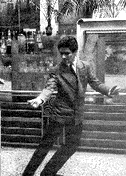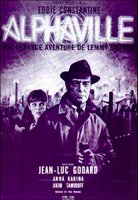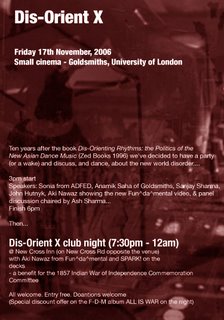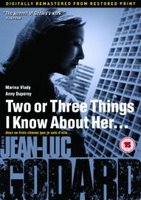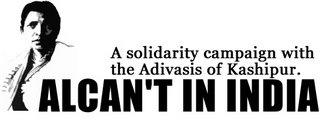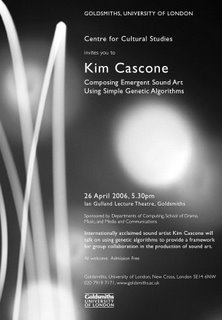
The Centre for Cultural Studies of Goldsmiths College presents a day conference on Maoism
Friday Dec. 1st 2006 Cinema Goldsmiths College Main Building 1-6:30 PM
1:00 PM
Introduction: Why Mao? Why Now?
Maude Colville
1:25 PM
The Flaming Forests of Jharkland: Everyday life between Revolution and the State in Eastern India
Alpha Shah
2:05 PM
The Black Panther Party and Mao
Sukant Chandan
2:45 PM
Break
3:05 PM
The Fate of Friend and Enemy in the Village called Peace and Benevolence
Michael Dutton
3:45 PM
Learning with Mao: Revolutionary Pedagogy in Post-Althusserian Thought
Alberto Toscano
4:25 PM
Break
4:35 PM
Maoism and the Call of the Future: Bob Avakian and the Next Synthesis
Bill Martin
5:55 PM
Panel and Discussion
6:30 PM
Reception
Maude ColvilleIntroduction: Why Mao? Why Now?
Why have a conference on Maoism in a heart of 21st century post-industrial post-colonial European Capitalism? What interest would Maoism hold for an Urban Bourgeois Institution of Intellectuals in an era in which Communism allegedly has been historically ‘surpassed’ and Mao’s work and influence has been maligned internationally as ‘Democidal’? Two decades after China itself began its own ‘De-Maoification’? Is it an art school’s Post-Modern Nostalgic fondness for Totalitarian Trinkets? Why focus on Maoism in particular out of all forms of Marxist-Leninism? A Taste for the Oriental and Exotic, or did Mao’s thought contribute something vital to the international communist struggle? Why does Maoism continue to inspire theory and revolutionary struggle far beyond the bounds of China and Chinese Culture, beyond the divisions of East and West, North and South? Why has Maoism had such a strong international philosophical influence? This small day conference attempts to address those and other questions by looking at different currents of Maoist thought and practice in the US, France, India and China.
Maude Colville is a PhD student of Cultural Studies at Goldsmiths College. She is doing her doctoral research on the representation of the attacks of Sept. 11th 2001 as Sublime. Her research interests include the relationship between democracy, violence and revolution; the Haitian Revolution, Spinoza, Hegel and Qur’anic Democracy.
Alpa Shah The Flaming Forests of Jharkhand:Everyday life between Revolution and the State in Eastern India.
In the forested plateau of Jharkhand, Eastern India, live some of the country's most marginalised populations, its *adivasis*. Despite containing some of the country's richest mineral wealth, this is the India that is often considered a place where, 'nobody goes, the wild east, the subcontinent's heart of darkness' (The Independent Magazine, 11 March 2006: 17). In recent months, however, this part of India has gained increasing international attention as the media eye turned to its flaming forests - the rural spread of underground armed guerrillas, commonly called the Maoists or the Naxalites, heirs to the revolutionary ideology of Marx, Lenin and Mao Zedong. In March 2006, the Indian Prime Minister, Manmohan Singh, declared the rebels as the 'single biggest security threat' the country has ever faced. The State has publicly waged a war against the Naxalites and rural people in Jharkhand are often caught between the forest fires. This paper explores how and why the Maoist revolution is spreading through Jharkhand. Blurring the boundary between the state and the 'terrorist', the paper shows the initial spread of the revolution to be dependent on the control over a market of protection to access the informal economy of the state. With the increasing strength of the revolution, the paper outlines pressing questions for future research on the relationship between ideology and practicalaction.
Alpa Shah, Lecturer of Anthopology Goldsmiths College, University of LondonBorn in Kenya, I emigrated to England in 1991 where I was awarded a bachelor's degree in Geography from the University of Cambridge (1994-1997), a Masters (1997-1998) and a PhD (1999-2003) from the Department of Social Anthropology at the London School of Economics and Political Sciences.My doctoral research took me to the state of Jharkhand in Eastern India. Here, I explored international debates of postcolonial development around the state, democracy and corruption, labour migration and the environment, the development of indigenous movements and the spread of revolutionary armed guerrillas – the Naxalites. I considered the politics of how diverse people in rural Jharkhand experience these issues and how, in particular, the local appropriation of global discourses can maintain a class system that further marginalises the poorest. I am currently writing a monograph on this work entitled, 'In the Shadows of the State: Indigenous Politics in Jharkhand, India'.I will continue pursuing these research interests in Jharkhand. I also intend to theoretically and empirically explore the relationship between migration, identity, law, citizenship and the nation-state, tracing the genesis of changing British immigration laws and their differential affects on people moving between India, Kenya and Britain. I was offered a teaching position in the anthropology department at Goldsmiths in 2003. Here, I convene a Masters programme in Development and Rights and also teach courses on the Ethnography of South Asia and Contemporary Social Issues. I am interested to hear from students who would like to pursue research on adivasis, indigenous politics, and anthropology of the state, violence, revolution, development and environment. Special Edited Journal Volume-2006 with T. Kelly. 'A Double Edged Sword: Protection and State Violence'. With an Introduction. Critique of Anthropology 26. Refereed Journal articles:2007 In press 'Keeping the state away': democracy, politics and imaginations of the State in India's Jharkhand. In Journal of Royal Anthropological Institute. March issue.2006 'Markets of Protection: The Maoist Communist Centre and the State in Jharkhand, India.' In Critique of Anthropology. (Special edited collection by T. Kelly and A. Shah) 26: 297-314. Also in Pratten, D. and A. Sen (2007) Global Vigilantes. London: Hurst. 2006 'The Labour of Love: Seasonal Migration from Jharkhand to the Brick Kilns of Other States in India.' In Contributions to Indian Sociology (n.s). 40 (1) 91-119.2003 with Lewis, D., Bebbington, A.J., Batterbury, S.P.J., Olson, E., Siddiqi, S., and Duvall, S. 'Practice, Power, Meaning: Frameworks for studying organizational culture in multi-agency rural development projects'. In Journal of International Development. 15, 1-17.Film: 2002 'Heads and Tales'. Co-Directed with Ajay TG. A Jandarshan Production. A 22 minute documentary film in English and Hindi on tradition and politics in Jharkhand.
Sukant Chandan
The Black Panther Party and Mao
Possibly the greatest inspiration internationally for the Black Panther Party was Mao Tse Tung, and the leadership which the Chinese Community Party gave the general worldwide anti-imperialist insurrection at the time. The main question that will be expored is: How beneficial was it for the first national armed and radical organisation of the Black masses in the USA to be identified so closely with Communist China and Mao?
Sukant Chandan is a political analyst who specialises in radical struggles and insurgencies in the USA, the Middle East and Ireland.
Michael Dutton The Fate of Friend and Enemy in the Village called Peace and Benevolence
The story of Mao in contemporary China is the tale of political aesetheticisation. From trinketisation to the so-called 'Red Industry' Mao and his politics are being commodified.
I will highlight this process through telling the tale of two museum projects that are being inauguratedon either side of the small village of Anren, in China's Sichuan province. One museum was built to commemorate the life of a reviled landlord but has now become a stately home, while the other is a new museum designed to aestheticise the process of Cultural revolution. Together, they tell us of the fate of Maoism in contemporary China.
Michael Dutton, Professor of Politics, Goldsmiths College University of LondonMy research is characterized by a strong interest in contemporary social and cultural theory wed to a specific 'archive' called China. This has led to a range of rather disparate set of issues that quite often move my work out of the specifics of China. My current interests include an investigation of the politics of the gift, a study of the friend/enemy distinction, and an appreciation of the importance of everyday life in the flow of politics. Some Recent Publications: Policing Chinese Politics: A History (Duke University Press 2005).‘From Culture Industry to Mao Industry’, boundary 2, Vol. 32, No. 2 (2005), 151-168.‘Mango Mao: Infections of the Sacred’ Public Culture, Vol. 16, No. 2 (2004),161-186. Streetlife China (Cambridge: Cambridge University Press, 1998).
Alberto Toscano Learning with Mao: Revolutionary Pedagogy in Post-Althusserian Thought
The recent work of Alain Badiou and Jacques Rancière has foregrounded a thinking of uncompromising intellectual egalitarianism, pitted against the philosophical traditions of transcendentalism, naturalism and intuitionism. In this presentation, I wish to excavate the specifically Maoist roots of Badiou’s and Rancière’s commitment – against the Althusserian notion of ‘science’ – to an axiomatic notion of equality, distilled in the philosophical slogan: ‘people think’. In particular, I want to contrast Badiou’s and Rancière’s reflections on political and philosophical pedagogy to Mao’s early writings on schooling and to the policies on intellectuals in the Cultural Revolution
Alberto Toscano, Lecturer of Sociology at Goldsmiths College, University of London Research interests focus on contemporary social theory and philosophy; Marx and Marxism; recent French thought, in particular the writings of Alain Badiou, Gilles Deleuze, and issues around political ontology; biopolitics; anti-capitalism; theories of political subjectivity; collective and technological individuation (Gilbert Simondon); vitalism and neo-monadology (Tarde, Whitehead); Italian Marxism and operaismo (Panzieri, Tronti, Negri); debates on post-Fordism, immaterial labour and cognitive capitalism; the historical materialist geography of David Harvey; the link between religion and politics (fanaticism, messianism, and political theology). Recent publications include: The Theatre of Production: Philosophy and Individuation Between Kant and Deleuze (Palgrave 2005); the co-edited and co-translated books Alain Badiou, Theoretical Writings (Continuum 2004), including the postface ‘Aleatory Rationalism’ (with Ray Brassier) and Alain Badiou, On BeckettThink Again: Alain Badiou and the Future of Philosophy (Continuum 2004); ‘From the State to the World?: Badiou and Anti-Capitalism’, Communication & Cognition, 37, 1/2 (2004); ‘Factory, Territory, Metropolis, Empire’, Angelaki 9.2, ‘Politics of Place’, special issue, August 2004; ‘Ethics and Capital, Ex Nihilo’, Umbr(a): A Journal of the Unconscious, 2005; he co-edited the issues ‘What is Materialism?’ (2001) and ‘Foucault: Madness / Sexuality / Biopolitics’ (2002) of Pli: The Warwick Journal of Philosophy. He is currently working on two interrelated projects: a study of the resurgence of egalitarian politics in contemporary thought, provisionally entitled The Communist Hypothesis, and a book on the role of the notion of “fanaticism” in the history of modern social and political thought, focussing specifically on debates around the German Peasants’ War of 1525 and the heritage of the Kantian distinction between fanaticism and enthusiasm. (Clinamen 2004), including the introduction ‘“Think, Pig!: An Introduction to Badiou’s Beckett’ (with Nina Power); ‘Communism as Separation’ in P. Hallward (ed)
Bill MartinMaoism and the Call of the Future: Bob Avakian and the Next Synthesis
Since the passing of Mao Tse-tung, we have had thirty years of vilification of the Chinese Revolution and the Cultural Revolution. Why does this matter? Is there a line to be drawn from the experience of the "Mao era" to the future? What is the future of Maoism, and what does Maoism have to do with the future? Has the world changed in significant and fundamental ways in the last thirty years? If so, has this rendered Maoism obsolete, or is it the case that, instead, we need a new synthesis, but one that comes out of the experience of Maoism? What are the ways in which Bob Avakian is both developing Maoism and attempting to surpass it? As a postscript, Why has it been so difficult to develop a Maoist trend in the U.K.?
Bill Martin, Professor of Philosophy at DePaul University, Chicago. Bill was educated at the University of Kansas. He works in the areas of social theory and continental philosophy, as well as aesthetics (especially literary and musical), philosophy of religion, and analytic philosophy. He has published six books, the most recent being Avant rock: Experimental music from the Beatles to Bjork (Open Court,2002). He has two books coming out with Open Court in spring 2005: Ethical Marxism: the categorical imperative of liberation,and the co-authored volume Marxism and the call of the future: conversations on ethics, history, and politics. Among his current writing projects are texts on sexuality, the question of community, and the culture of postmodern capitalism.
.

